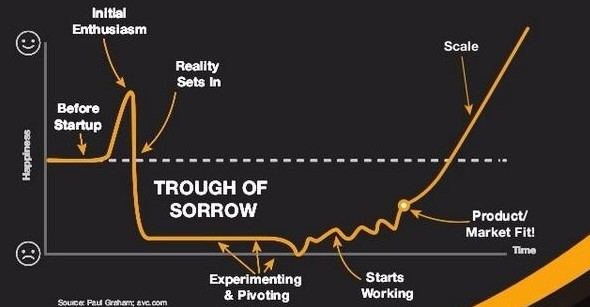A tech-startup with a spectacular aura: innovative, disruptive, industry leading, successfully fund-raised, cool offices, great reputation, working with highly intelligent and creative people and as the founder you have the independence and freedom to fulfill your own dreams. They name successful start-ups after mythical creatures because the thing that makes them special is a type of magic that you can’t earn or buy.
Everyone has ideas, some good, some not. Some of the ideas are marvelous and revolutionary and yet, 97% of all the tech start-ups will fail and from the remaining 3% which can be defined as a success — only a handful will become big companies, while the rest will do a small/medium exit. Why is this? Most start-ups all have the same components, smart people, great ideas and a hunger to succeed, yet only a few go on to make a mark on the world. What sets them apart? It’s something you can’t see or quantify. Yes, there are principles that all successful start-ups incorporated on their way to success, but there is no set formula that you can use in order to succeed.
One of my favourite diagrams to describe the start-up journey is the Start-up Curve by Paul Graham.
The Startup Curve graph; by Paul Graham, avc.com
The amazing initial enthusiasm that carry away the entrepreneurs, the diving into the trough of sorrow when the start-up is fighting constantly to find its’ way in the market, up to the golden point when the start-up hits the Product-Market-Fit and begins to scale.
But this graph is also misleading, almost a lie, as it’s totally out of scale. The reality is that the first stage, before reality sets in can take from a few days up to few weeks, no more than that. Then the time scale in the trough of sorrow, well… that can take a few years and might feel like an eternity. Like a thirsty and hungry person who is lost in the middle of the desert, without a map or compass, who can only see the horizon in the same shape and distance, every single day — the only powers that give them the strength to continue are faith and determination.
The feeling I had when I invented Whichit a few years ago was spectacular. A period full of energy, enthusiasm, creativity and pure initiative — aiming to change the way marketers interact with their audience. It’s been 4 years since I founded Whichit, relocating from Israel Startup Nation to Great Britain alongside my two Co-Founders, Yarden and Galit. A long and hard journey that taught me one main thing about tech start-ups: It’s not about the idea, but it’s all about the execution of the founding team, over a period of time.
Even today, after few years of running our start-up, with rich experience in the Trough of Sorrow, we are still holding the faith and belief of the idea. We can feel and see it in every aspect of the business — from the support and care from our investors, who joined us on this long journey, our business partners who recognize the unique and innovative value we are bringing to market, the successful commercial activities with our clients who are growing by the week and last but not least, our team: technically “employees”, but practically they are the soul of the start-up and keep on fighting even in the darkest hours; a team you want by your side when you’re building a tech start-up.
Being a Founder-CEO of a hi-tech start-up is a bitch (excuse my French). Long hours, hard work, working under constant uncertainty, great responsibility, constant concerns. As a Founder-CEO you are overloaded at every single moment, dealing with millions of tasks that cross every aspect in the business world no matter what your background is, while you have few resources. Every day is a challenge that becomes a struggle, getting “Nos” on a regular basis and still trying to continue like nothing happened. To be the Founder-CEO of a hi-tech start-up is doing the impossible every single day.
I was fortunate to have two super talented Co-Founders. Yarden, our CTO, covering all technology aspects of the business. From taking the concept and the initial definitions to full production. Even though when we began he didn’t have full knowledge and experience of several technologies and code languages, he was able to learn and perform with almost a vertical learning curve, with extraordinary talent and improvisation to achieve our product goals.
Galit, out Creative Director, is the master talent of the company. Basically, every single pixel in Whichit: it’s her design. From the creative language, the commercial campaigns, marketing and sales materials, website, blog and social channels, up to the full definition of the products, the user experience and interface. Thanks to her talent and creativity, we won the ‘Start-up of the Year’ from Facebook in 2015.
As we already know, talent is very important but not enough. The core team never stops surprising me with their dedication and hard work, sometimes with sacrifices of very late nights, working during weekends and holidays. Constantly communicating around work to execute our plans successfully. Getting into the small details and putting their care and personal touch in every corner of the product, services and piece of work, putting their soul into the tech.
The WBS Of The Founder-CEO
I had the chance to look back, reviewed all the disciplines I was involved with in the past few years of running my tech start-up. The millions of tasks spread across every domain and industry exists in the startup and business worlds. I don’t think there is a better school or degree that can teach you what can be learnt in a single year as a Founder-CEO of a hi-tech start-up.
The WBS Of The Founder-CEO [see full picture]
I created this Founder-CEO WBS (Work Breakdown Structure) diagram, which contains every domain and Scope Of Work (SOW) I personally dealt with, while running my tech start-up, Whichit. There are three levels of involvement I’m defining for each scope of work:
Full — From definition and planning to delivery and full execution of the scope of work.
Partial — Taking active part in the task execution, together with colleagues or a service provider.
Shell — The action(s) taken was one or more of the following, while the actual task was created and delivered by someone else: planning, defining, managing, controlling, reviewing, mentoring, guiding.
As Founder-CEO of a hi-tech start-up, you will find yourself dealing with ALL of these components, while your level of involvement in each of them in the beginning of your start-up will be entirely on you, the more progress you make and the more team members you have, the level of your involvement will decrease, still everything depends on you. You may not have the professionalism, or you may not like a lot of these tasks (who likes to deal with GDPR or creating a company’s manual?!?), but like it or not, the execution of your tech start-up is dependent on each and every one of these small parts.
The T-Model In Professionalism
As you can imagine, it’s impossible to be an expert in every single discipline in the industry, nevertheless having the time to deal and manage everything together. The following model I created represents the variety of domains (horizontal) in the tech start-up world and the level of professionalism in each aspect (vertical). While the middle point is YOUR core professional domain, the more you move away from the center, the less professional YOU are in these domains.
The T-Model in professionalism is personal and will be different for each person. The goal of using it is to better understand where your strengths and weaknesses are in terms of knowledge, understanding and professionalism in each aspect of the start-up world. As an output, it will enable you to concentrate on working with your core specialties and expertise, while having others cover the specialties you are weak in.
The T-Model in Professionalism
As I mentioned before, EXECUTION is the key ability in a tech start-up. Not the idea itself, nor the tech, not the market and for sure not how much money the start-up has raised.
In its first years, until it becomes a stable company, a tech start-up IS NOT based on the traditional business models of T&M (Time and Materials) nor Bricks and Mortar, but more as an ongoing project, with a general direction and goal that is represented in a heuristic concept and with low resources to none.
Execution is defined as the ability to carry out a plan, order, or course of action. In simple words for the Founder-CEO of a hi-tech start-up, it is your ability to:
Understand the start-up’s current situation.
Measure your direction and distance to the main goal.
Recognize the gaps and up-coming challenges.
Translate gaps and challenges to tasks and prioritize.
Act.
Repeat. Every single day.
Good luck with doing the impossible possible and may the force be with you.
Jonathan
Whichit is an interactive commercial content platform that enables marketers and advertisers to increase user engagement, open new revenue streams & gain user-related insight. The company has an innovative technology that profiles users based on their preferences and uses machine learning to provide bespoke commercial incentives in real time.
The company is working with top agencies and brands and based in central London.








![The WBS Of The Founder-CEO [see full picture]](https://images.squarespace-cdn.com/content/v1/568abe4569492ea07bd8d391/1542016051088-S2RCT9BES080G6NIVX32/WBS+Of+The+Founder-CEO+-+Nov+2018.jpg)



